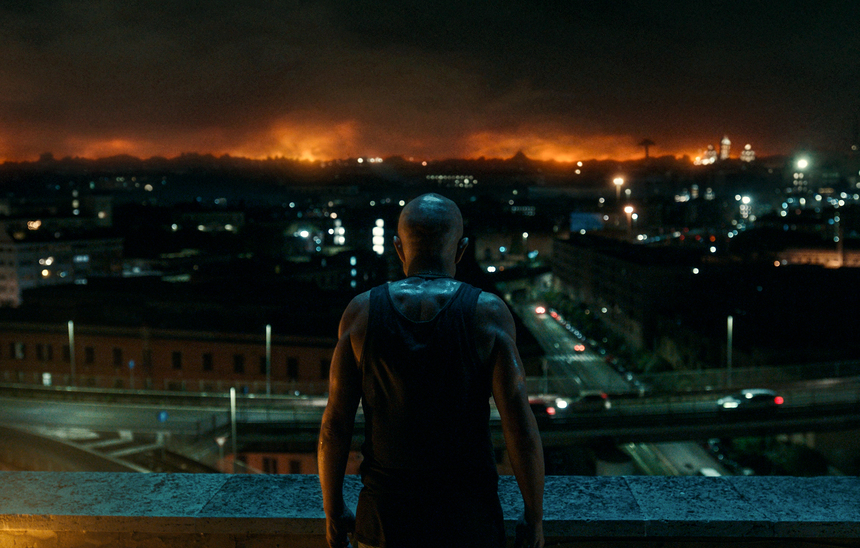Busan 2023 Review: ADAGIO sees Rome Burn in Stefano Sollima's Operatic Crime Saga
Stefano Sollima directs Tony Servillo, Pierfrancesco Favino, Adriano Giannini, and Gianmarco Franchini

Italian genre stylist Stefano Sollima returns to his homeland to complete his thematic “Roman Trilogy” that began with his debut ACAB - All Cops Are Bastards ( 2012) and continued in Suburra (2015) with the muscular and kinetic crime drama Adagio. Heavyweights Pierfrancesco Favino (The Traitor) and Tony Servillo (The Great Beauty) lead a robust cast in a timeless tale of corrupt cops and honourable crooks, set against a backdrop of political upheaval and natural disaster.
The action follows Manuel (Gianmarco Franchini), a young man who lives with his elderly father, Daytona (Servillo), who is steadily losing his grasp on reality. Manuel is being manipulated by a gang of shady cops to go undercover at a secret hedonistic nightclub and take compromising photographs of a high-ranking politician. But when he loses his nerve, Manuel flees the scene with the evidence, prompting the cops to give chase.
Instead of going home, Manuel turns to a pair of his father’s old acquaintances for help, and it quickly becomes apparent that Daytona was once a powerful crime boss in the Rome underworld. These two former accomplices, the blind Polniuman (Valerio Mastandrea) and the hulking Romeo (Favino) are initially reluctant to assist Manuel, but when it becomes apparent that Vasco (Adriano Giannini) and his squad will stop at nothing to catch Manuel, these gangland dinosaurs are forced back into the fore.
Sollima, son of legendary Italian filmmaker Sergio Sollima, director of The Big Gundown, Revolver and many more, retains his father’s appetite for telling operatic stories of honourable criminals embracing their violent destiny. He was a pivotal creative force behind the epic crime series Gomorrah, and even managed to add a stylistic flourish to the poisoned chalice that was Sicario: Day of the Soldado. On home turf, however, Sollima has always gone for broke, elevating tried and tested genre narratives to almost mythic status.
In Suburra he presented Rome as a city drowning under a constant torrential downpour that saw the drains erupt and turn the city into one giant sewer of corruption and excess. In Adagio, Rome is literally burning, constantly aglow from the constant hill fires that threaten to engulf the suburbs at any moment, while showering the highways with ash. The failing infrastructure is also evident as blackouts throw Rome into darkness time and again throughout the night.
While Manuel is nominally the film’s protagonist, the real drama emerges between the reawakening of a pair of dormant titans. Servillo reminds us once again that even at 64 he remains arguably Italy’s finest working actor. There is a deceptive gravitas and ferocity to Daytona that slowly comes into view as the film unfolds, which Servillo unveils with the simplest of facial expressions or measured delivery of seemingly inconsequential dialogue.
The real star of the show, however, is Pierfrancesco Favino’s Romeo, a ferocious ex-con known on the city streets as The Camel. Unrecognisable with a shaved head and natty wife-beater, Favino introduces Romeo as a man of limited intelligence and compassion, who thinks best with his fists or a swift butt of the head rather than with anything more cerebral. However, the appearance of Manuel into his life forces him to take stock of his past, his role in Rome’s criminal outlook, and sets about putting his own legacy into action.
Adriano Giannini , whose father Giancarlo is also Italian film royalty, more than holds his own as the conniving, blackmailing detective Vasco, a single father of two teenage boys, whom he holds just as dearly as the other members of his underhand crew.
What unfolds is a rousing combination of slick execution, dramatic grittiness, and grandiose morality that revels in the mythic archetypes of the genre and swings for the fences with its Shakespearean themes of honour, loyalty, destiny and death.

Do you feel this content is inappropriate or infringes upon your rights? Click here to report it, or see our DMCA policy.






